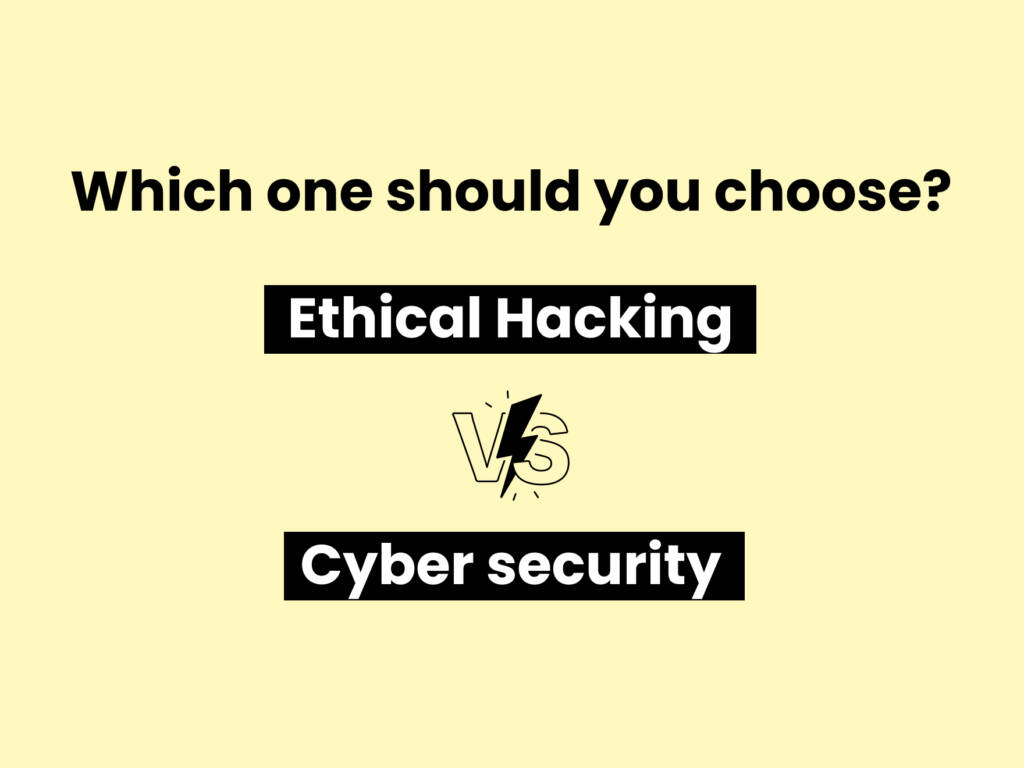Arjun was a curious student who took interest in exploring how computers worked. One day, he found the school Wi-Fi password using browser settings and showed it to his teacher. Instead of scolding him, the teacher said, “You’re thinking like a hacker — the good kind.” That’s when Arjun first heard about ethical hacking. Later, he realized it was part of a larger field called cybersecurity.
So what’s the difference between the two? And which one should you choose as a career? Let’s break it down.
What is Cybersecurity?
Cybersecurity is like a big umbrella that protects everything in the digital world. It’s all about keeping data, devices, and networks safe from attacks.
This includes:
- Setting up firewalls
- Preventing viruses
- Stopping hackers
- Securing apps and websites
- Protecting personal and financial information
If a company gets hacked or if customer data is leaked, the cybersecurity team jumps in to fix it — or better yet, stop it before it happens. So, cybersecurity is about defense. It’s about building systems that are hard to break.
What is Ethical Hacking?
Now, ethical hacking is like testing that defense.
Ethical hackers (also known as white-hat hackers) are paid professionals who try to hack into systems — legally — to find weaknesses before the bad guys do. They think like real hackers but work for the good side.
Their job is to:
- Break into apps and systems (with permission)
- Find loopholes
- Report the problems
- Help fix them
If cybersecurity builds the walls, ethical hackers test those walls to see where they’re weak.
Key Differences
| Feature | Cybersecurity | Ethical Hacking |
| Goal | Protect systems and data | Find and fix security flaws |
| Approach | Defensive (stop attacks) | Offensive (simulate attacks) |
| Tools Used | Antivirus, firewalls, monitoring tools | Kali Linux, Metasploit, Nmap |
| Mindset | Prevent and respond | Explore and break (ethically) |
| Workplace Role | Security analyst, architect, engineer | Penetration tester, red team specialist |
Both are super important. They just tackle the problem from different angles.
Which One’s Right for You?
You Might Be Into Ethical Hacking If:
->You enjoy finding loopholes or bugs
->You like puzzles and reverse-engineering things
->You’re curious, creative, and a little rebellious (in a good way)
->You want to think like a hacker — but stay on the right side of the law
Ethical hacking is more about exploration and braking systems (with permission) to help companies fix weak spots. It’s challenging and fun, but you need to be fast, sharp, and always up-to-date.
You Might Prefer Cybersecurity If:
->You like protecting systems and building safe environments
->You enjoy planning, policies, and architecture
->You want to work in roles like SOC analyst, security engineer, or incident responder
->You’re focused on strategy and long-term defense
Cybersecurity gives you a broader scope. From securing passwords to managing large networks — it covers everything. It’s perfect if you like stability and systems thinking.
Career Paths and Salaries
Both fields are growing fast. And both are high-paying, in-demand careers.
- Ethical Hackers can become:
- Penetration Tester
- Red Team Specialist
- Bug Bounty Hunter
- Security Consultant
- Penetration Tester
- Starting salary in India: ₹4–6 LPA
With experience: ₹10–15 LPA or more - Cybersecurity Professionals can become:
- Security Analyst
- Security Engineer
- SOC (Security Operations Center) Specialist
- Cybersecurity Architect
- Security Analyst
- Starting salary in India: ₹4–7 LPA
With experience: ₹10–30 LPA depending on skills and certifications
Skills You’ll Need
For Ethical Hacking:
->Knowledge of programming (Python, C, etc.)
->Networking basics (IP, ports, protocols)
->Operating systems (especially Linux)
->Tools like Nmap, Burp Suite, Wireshark
->Certifications: CEH, OSCP
For Cybersecurity:
->Understanding of networks and firewalls
->Security compliance and policies
->Cloud and system security
->Monitoring and incident handling
->Certifications: CompTIA Security+, CISSP, CISM
You can always move from one field to the other — they overlap a lot.
So, Which One Should You Choose?
It depends on your personality and interests.
- Want to test systems and think like a hacker? Go for ethical hacking.
- Want to build secure environments and monitor threats? Choose cybersecurity.
Some people even do both. Many ethical hackers start in cybersecurity and later specialize.
Choose a Future-Ready Degree
If you’re a student just finishing school or college, and this field excites you, now’s the best time to get into it.
At FACE Prep Campus, we offer tech-focused degree programs like:
- BSc in Cloud Computing & Cybersecurity
- BCA with Data Science & AI
- BCA with DevOps and Game Development
These aren’t just regular degrees — they come with 80% hands-on training, real-world projects, and 100% placement assistance. Our mentors are industry experts who’ll guide you to build a career in ethical hacking, cybersecurity, and beyond.
